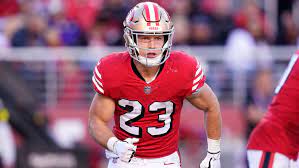By Marvin Moore August 30, 2023
Barry Sanders. Emmitt Smith. Terrell Davis. In the 1990s, some of the NFL’s biggest stars were running backs. But times have changed. It’s not because America’s favorite sport has become a pass-happy league. It’s because teams have adopted a plug-and-play strategy that benefits their bottom lines.
Las Vegas Raiders running back Josh Jacobs led the league in rushing last year with 1,653 yards on 340 carries. The 25-year-old elite rusher finally signed a one-year deal in late August worth up to $12 million. However, the Raiders ink injury-prone quarterback Jimmy Garoppolo a three-year, $67.5 million contract. That’s an annual salary of over $22.5 million or $10.5 million more than Jacobs will earn this season.
There is no doubt that Jacobs is a more valuable offensive weapon than Garoppolo, who lost his starting job to second-year quarterback Trey Lance last season. Without a competent running game, NFL passers are easy prey for pass rushers. So why has the league devalued the running back position? To save money.
The salary for quarterbacks, even mediocre signal-callers like Garoppolo, has skyrocketed. The value of running backs in terms of importance to their teams’ success has remained the same since the 1990s. But how much teams are willing to pay running backs has changed significantly.
New York Giants running back Saquon Barkley tallied 1,312 yards and ten touchdowns on the ground last year and added 57 catches for 338 yards. There is no way the G-Men advanced to the playoffs a year ago without Barkley. Still, the former Offensive Rookie of the Year had to threaten a possible holdout before signing a one-year deal worth a little over $10 million.
The Giants also signed their underwhelming quarterback, Daniel Jones, to a massive four-year, $160 million contract extension. A whopping 20 passers threw more touchdowns than Jones last season, including Davis Mills and Andy Dalton. But even though Barkley is more important to the offense than Jones, he will earn almost $30 million less this season than the below-average quarterback.
Running backs have become expendable because the evolution of committee backfields exposed an ugly truth. The career span of a ball carrier can be extended with a pair of rushers sharing the workload. But, with part-time work comes part-time money.
Running backs have the shortest average career length of all NFL position groups at 2.57 years. Instead of investing long-term in a player that will not be productive for very long, some teams will ride a workhorse back for 2-3 seasons before replacing him with a younger, cheaper option.
It’s a lose-lose situation for running backs that is made even worse with rookie contracts. All rookies sign four-year deals that are locked in based on where each player is selected. While all other position players are rewarded with lucrative extensions after their third productive season in the league, running backs are offered one-year deals regardless of their success on the field.
Professional football is a business, and cutting costs is good business. However, not paying fair wages to valuable employees is just not right. When a 21st-ranked quarterback earns $30 million more annually than a top-3 running back, something is very wrong.
The Philadelphia Eagles proved in 2017 that quarterbacks are also expendable. Nick Foles led the Eagles to victory after Carson Wentz was injured. Even elite wide receivers are expendable. The Kansas City Chiefs won last year’s Super Bowl after Tyreek Hill was traded to the Miami Dolphins.
The evolution of the NFL from a run-first game to a passing league has relegated running backs to a supporting role. It’s a reality that only a few teams, namely the Pittsburgh Steelers and Atlanta Falcons, have not followed.
Running backs deserve more respect for their significant contributions to the success of their teams. But when it comes to economics, the bottom line trumps doing the right thing.



